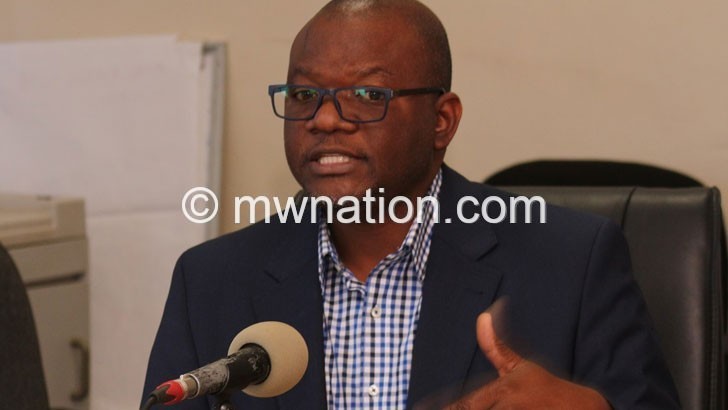Red tape choking ACB
Long delays by the Accountant General’s Office to authorise and clear cheques frustrate graft-busting fight, Anti-Corruption Bureau (ACB) director general Reyneck Matemba has said.
In an interview last Thursday, Matemba said there is also a counterproductive requirement for the bureau to make disclosures of its impending arrests or other operations every time it requests funding for its activities.

He said the procedure leads to leakage of sensitive information about its investigations.
“The nature of our job involves handling urgent matters, such as making prompt arrests or doing surveillance. We cannot effectively do this if we have to wait for two or three months before our cheques are cleared.
“We also share the office building in Lilongwe with the World Bank and take turns in paying for electricity bills. There have been instances when electricity units are finished and I have to rush to the ATM [automated teller machine] to withdraw money and buy tokens,” he said.
According to Matemba, the delay to authorise and clear cheques forces him to make personal financial sacrifices to fund urgent investigations and arrests.
The ACB chief also believes the bureau is compromised when it makes disclosures to the Accountant General’s Office when requesting for funds. Treasury instructions require ACB to disclose what the money being requested will be used for.
He suspects that when officers at the Accountant General’s Office know what the bureau wants the money for, apart from leaking information to suspects, they also sit on the requests to frustrate the moves.
Matemba argued that on several occasions, suspects have threatened to beat up the bureau’s officers, after being alerted by some civil servants at the Accountant General’s Office about an impending investigation or arrest.
He made the revelation amid growing pressure from the public for the bureau, which has a backlog of 3 000 cases, to commence and conclude some high-profile cases.
Some of the cases are:
- The 2011 Malawi Police K5 billion Cashgate cases involving four accused persons;
- Former minister Uladi Mussa’s corruption case for allegedly aiding foreign nationals to acquire citizenship fraudulently;
- Former lawmaker Mzomera Ngwira’s corruption case of allegedly abusing his position as MP in awarding a contract;
- The K1.4 billion Bakili Muluzi case;
- And an alleged corruption case involving FDH Holdings chief executive officer Thom Mpinganjira.
Apart from paying investigators, prosecutors, drivers and security personnel, Matemba said he has also been footing utility bills at the Lilongwe office.
Weekend Nation has seen copies of some of the claim receipts awaiting payment from the Accountant General’s Office in excess of K2 million and dating back to four months ago.
The claim for reimbursements include K1.1 million paid as allowances, accommodation and fuel for investigators and supporting staff who travelled to Nkhata Bay to record statements from Constitutional Court (ConCourt) judges on an alleged judge shopping case.
There are also receipts of over K400 000 the bureau spent when some of its officers went to Blantyre to make an arrest in connection with the alleged bribery of ConCourt judges.
In a telephone interview, Legal Affairs Committee of Parliament chairperson Kezzie Msukwa described ACB’s situation as “worrisome”.
He said the committee started lobbying Treasury during the last cluster meetings to resolve the problem after Matemba presented the matter to them. But Msukwa said there has not been much commitment from Capital Hill to consider the requests.
The chairperson observed that other governance institutions, including the Ombudsman are also surviving on hand-to-mouth, a situation that is choking their delivery of services.
Said Msukwa: “As a committee, we will continue to engage Treasury on this matter because we are aware of how governance institutions are struggling to provide services to millions of poor Malawians out there.”
He suggested that Treasury could ease ACB’s problem by allowing it to operate a special account in the same way it allows institutions such as the Financial Intelligence Unit (FIU) to do so.
Msukwa also pledged that his committee will lobby for a waiver to give ACB some confidentiality in its operations.
Ministry of Finance, Economic Planning and Development spokesperson Davis Saddo said, in an interview on Thursday, he was aware of the lobbying by the Legal Affairs Committee, but requested the graft-busting body to follow laid down procedures.
“There are procedures and considerations that are made to effect such arrangements. As a government agency, ACB should know which doors to knock,” he said.
But according to Matemba, ACB followed the procedures when they presented the request for a waiver to Parliament during cluster meetings which Treasury officials attended.
“When the [Legal Affairs Committee] sought a response from the Treasury officials, they only indicated that the concerns will be looked into,” he explained.
During the current financial year, ACB was allocated K3.7 billion, an amount Matemba said is not enough for its activities as it includes salaries, rentals, water, electricity and the purchase of capital equipment.
The ACB boss said the bureau has seven prosecutors against an establishment of 21 and is overstretched with ongoing cases to the extent that it cannot start new cases.
“Unfortunately, there is only so much that we can do; the sad reality is that we can’t manage to start prosecuting all the cases,” he said.





